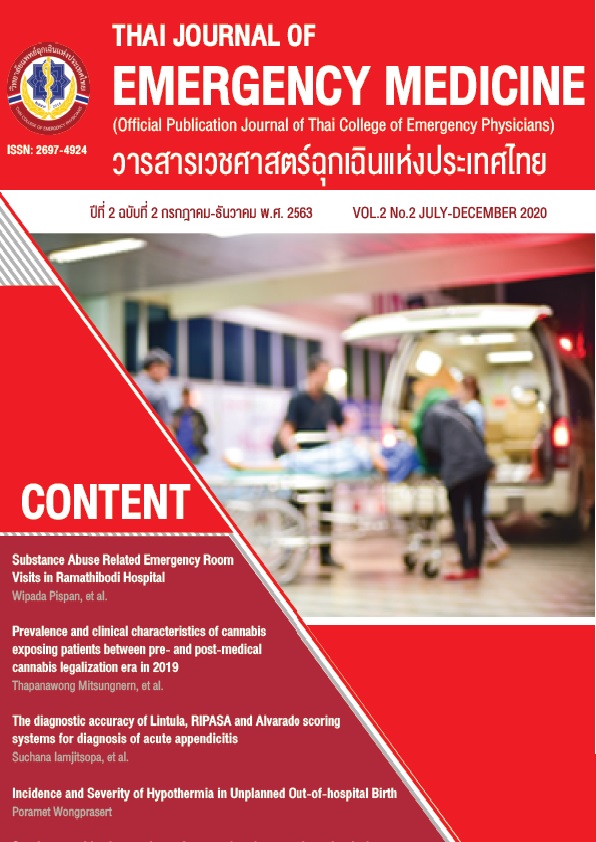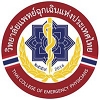Prevalence and clinical characteristics of cannabis exposing patients between pre- and post-medical cannabis legalization era in 2019
Keywords:
medical cannabis, marijuana, the narcotic act, health effectAbstract
Introduction : Cannabis has been used for therapy in the ancient medicine era several thousand years ago. However, It has been labeled as an addictive substance in many countries including Thailand. There is an increasing tendency of the use of cannabis in modern medicine in many countries such as the Netherlands, New Zealand, Switzerland and many states in the United States of America. In 2019, the Thai narcotic act was amended, which led to the legalized medical cannabis.
Objectives : This study aimed to determine the prevalence of cannabis usage and its adverse clinical effects, as well as to determine routes of administration, presenting symptoms, reasons of cannabis using and hospitalization rate in Srinagarind Hospital, Faculty of Medicine, Khon Kaen University.
Methods : This was a retrospective descriptive study. Data was collected from medical records and laboratory database of Srinagarind Hospital during year 2018 to 2019.
Results : There was an increasing prevalence of cannabis exposed patients, from 2.6 per 100,000 patients in year 2018 to 10.6 per 100,000 patients in year 2019. The most common routes of administration were sublingual cannabis oil and smoking. The most common presenting symptoms were nausea and behavioral change. Recreational use was the common reason. There was an increasing rate of hospitalization in cannabis exposed patients from 2 people in 2018 to 15 people in 2019
Conclusion : After the amendment of Thai narcotics act in the year 2019, there was increasing numbers of the side effects of cannabis. However, further research to determine the long-term effects of cannabis may be required to prove its effect on health.
References
Nelson LS, Lewin NA, Howland MA, Hoffman RS, Goldfrank LR. Goldfrank's Toxicologic Emergencies. 10th ed. New York, NY: McGraw-Hill Professional; 2014.
อรรถสิทธิ์ ศรีสุบัติ, จุฑามณี สุทธิสีสังค์, สหภูมิ ศรีสุมะ, วีรวัต อุครานันท์, อาภาศรี ลุสวัสดิ์,อังกูร ภัทรากร และคณะ. คำแนะนำการใช้กัญชาทางการแพทย์ (อินเตอร์เน็ต]นนทบุรี:กรมการแพทย์กระทรวงสาธารณสุข;2563 [เข้าถึงเมื่อ 24 มี.ค.2564]เข้าถึงได้จาก: http://cannabis.fda.moph.go.th/wp-content/uploads/PDF/manual/February_2020/Guidance-Updated-v-4 _up-date-20200120-cover.pdf
Cooper ZD, Williams AR. Cannabis and Cannabinoid Intoxication and Toxicity. In: Cannabis Use Disorders. Cham: Springer International Publishing;2019.p.103-11.
พระราชบัญญัติยาเสพติดให้โทษ พ.ศ.2522[อินเตอร์เน็ต]กรุงเทพฯ: Krisdika.go.th:;2522 [เข้าถึงเมื่อ 24 มี.ค. 2564] เข้าถึงได้จาก: http://web.krisdika.go.th/data/law/law2/%C207/%C207-20-9999-update.htm
พระราชบัญญัติยาเสพติดให้โทษ (ฉบับที่ ๗) พ.ศ.๒๕๖๒ [อินเตอร์เน็ต]สงขลา: Psu.ac.th.;2562[เข้าถึงเมื่อ 24 มี.ค. 2564] เข้าถึงได้จาก: http://rdo.psu.ac.th/th/images/D3/PR-news/2562/Activity/kancha-goverment.pdf
ประกาศกระทรวงสาธารณสุข เรื่อง ระบุชื่อยาเสพติดให้โทษในประเภท ๕ พ.ศ. ๒๕๖๓ [อินเตอร์เน็ต]กรุงเทพฯ: Krisdika.go.th;2563 [เข้าถึงเมื่อ 24 มี.ค.2564] เข้าถึงได้จาก: http:/www.ratchakitcha.soc.go.th/DATA/PDF/2563/E/290/T 0033.PDF
. ระวังการใช้ผลิตภัณฑ์กัญชา [อินเตอร์เน็ต]กรุงเทพฯ:ศูนย์พิษวิทยารามาธิบดี คณะแพทยศาสตร์โรงพยาบาลรามาธิบดี มหาวิทยาลัยมหิดล; 2562 [เข้าถึงเมื่อ 24 มี.ค. 2564] เข้าถึงได้จาก: https://www.rama.mahidol.ac.th/poisoncenter/sites/default/fles/public/%E0%B8%82%E0%B9%89%E0%B8%AD%E0%B8%A1%E0%B8%B9%E0%B8%A5%09B8%819E0%B8B1%E0%B8%8D%E0%B8%8A%E0%B8%B2%E0%B8%A8%E0%B8%B9%E0%B8%99%E0%B8%A2%E0%B9%8C%E0%B8%9E%E0%B8%B4%E0%B8%A9%E0%B8%A3%E0%B8%B2%E0%B8%A1%E0%B8%B2%20edit.pdf
Kim HS, Monte AA. Colorado cannabis legali-zation and its effect on emergency care. Ann Emerg Med 2016;68(1):71-5.
Davis JM, Mendelson B, Berkes JJ, Suleta K, Corsi KF, Booth RE. Public health effects of medical marijuana legalization in Colorado. Am J Prev Med 2016;50(3):373-9.
Cerda M, Wall M, Keyes KM, Galea S, Hasin D. Medical marijuana laws in 50 states: investi-gating the relationship between state legal-ization of medical marijuana and marijuana use, abuse and dependence. Drug Alcohol Depend 2012;120(1-3):22-7.
Noble MJ, Hedberg K, Hendrickson RG. Acute cannabis toxicity. Clin Toxicol (Phila)2019;57(8):735-42.
Miller NS, Oberbarnscheidt T, Gold MS. Mar-ijuana addictive disorders and DSM-5 sub-stance-related disorders. J Addict Res Ther [Internet]. 2017 [cited 2021 Mar 24]. Available from: http://dx.doi.org/10.4172/2155-6105.S11-013
Russell C, Rueda S, Room R, Tyndall M, Fis-cher B. Routes of administration for cannabis use - basic prevalence and related health outcomes: A scoping review and synthesis. Int J Drug Policy 2018;52:87-96.
WHO. The health and social effects of non-medical cannabis use [Internet]. 2016 [cited 2021 Mar 24]. Available from: https://www.who.int/substance abuse/publications/msbcannabis.pdf
Stolzenberg L, D'Alessio SJ, Dariano D. The effect of medical cannabis laws on juvenile cannabis use. Int J Drug Policy 2016;27:82-8.

Downloads
Published
How to Cite
License
บทความที่ได้รับตีพิมพ์ในวารสารเวชศาสตร์ฉุกเฉินแห่งประเทศไทย ถือเป็นเป็นลิขสิทธิ์ของ วิทยาลัยแพทย์เวชศาสตร์ฉุกเฉินแห่งประเทศไทย
กรณีที่บทความได้รับการตีพิมพ์ในวารสารเวชศาสตร์ฉุกเฉินแห่งประเทศไทยแล้ว จะตีพิมพ์ในรูปแบบอิเล็กทรอนิกส์ ไม่มีสำเนาการพิมพ์ภายหลังหนังสือเผยแพร่เรียบร้อยแล้ว ผู้นิพนธ์ไม่สามารถนำบทความดังกล่าวไปนำเสนอหรือตีพิมพ์ในรูปแบบใดๆ ที่อื่นได้ หากมิได้รับคำอนุญาตจากวารสารเวชศาสตร์ฉุกเฉินแห่งประเทศไทย



